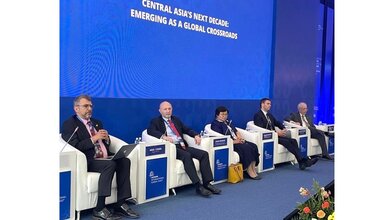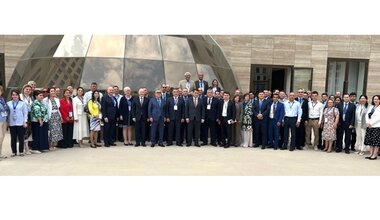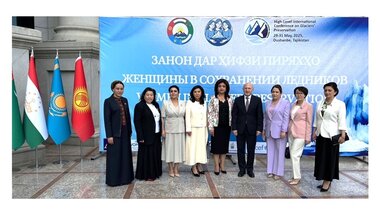SECRETARY GENERAL’S REMARKS AT ROUNDTABLE DISCUSSION ON WOMEN, PEACE AND SECURITY IN PEACEKEEPING CONTEXTS
New York, 8 October 2020
Excellencies, colleagues and friends,
Today, I have the honor of meeting – albeit remotely – four formidable women leaders who strive for peace in their regions and countries.
Thank you for joining us as we mark both the 75th anniversary of the United Nations and 20 years since the adoption of Security Council Resolution 1325 that Melissa has referred.
That resolution was a landmark -- a ground-breaking step spearheaded by the women’s movement and women leaders.
It recognized, officially for the first time, women’s leadership as foundational to international peace and security. And it underscored the link between gender inequality and fragility, and between women’s security and international security.
Since then, the United Nations has worked relentlessly to advance the women, peace and security agenda.
Women’s full, equal and meaningful participation in achieving and sustaining peace is a priority for the UN, essential for successful peacekeeping and a centerpiece in our Action for Peacekeeping initiative.
In the COVID-19 crisis, it has been women who have had the trust of divided communities to credibly disseminate public health messaging. Yet, it is women who are under siege, bearing disproportionate care and economic burdens and facing an alarming surge of violence in the home.
In situations of conflict, it is often women who are brokering peace at the community levels. And our operations’ partnerships with women leaders and their networks have proven critical to build trust and help prevent and resolve conflicts.
Yet women continue to be actively sidelined once those processes move to the national and international levels.
Data through 2018 show that globally, women constituted only 13 per cent of negotiators, 3 per cent of mediators and 4 per cent of signatories.
Women continue to have to fight for their voices to be heard, despite the mountain of evidence on the correlation between women’s participation and the sustainability of peace.
Today, we will hear some of the voices from four very different settings in which the United Nations supports peace processes: the Central African Republic, Cyprus, Darfur and Mali.
And If I may be allowed a short personal comment on these situations:
I would like to say that two years ago, I visited Mali during Ramadan – in my yearly Ramadan solidarity visit.
Three years ago, I spent UN Day in the Central African Republic, that I visited several times as High Commissioner for Refugees.
In the early months of my tenure, I met with the leaders of the Cypriot communities and participated actively in the Crans-Montana negotiations that, unfortunately, did not achieve the results we would want to have.
And in my previous capacity as High Commissioner for Refugees, I visited Darfur several times.
Across these engagements, I have seen not only the plight of the people affected, but also the central role of women in alleviating suffering and in forging peace.
In Sudan, the inclusion of women as signatories in the recent Juba peace talks is a notable achievement. Darfuri women have consistently advocated and worked for peace and security in the on-going national political transition. And by the way, in the whole of Sudan, women have an absolutely essential role of leadership in all the fantastic movement of the people that led to the present democratic transition.
In the Central African Republic, for the first time in the history of the country, women participated in the Khartoum peace talks, and one woman was a signatory to the agreement signed last year. This was a result of persistent and strategic advocacy by local women’s organizations. It is critical that we build on this momentum in the forthcoming elections, so that women participate meaningfully as voters and candidates and the elections are inclusive.
In Mali, women leaders across political lines are playing key roles in the current transition and in the search for peaceful and inclusive solutions. I congratulate Ms. Bintou Founé Samaké, who is with us today, on her recent appointment as Minister of Women, Children and Family Affairs. This is an important recognition of the tireless work of women civil society leaders for peace and security in Mali.
And in Cyprus, women were engaged on both sides of the peace table during the negotiations that took place from 2015 to 2017. Since then, women’s bi-communal peace walks have strengthened dialogue, cooperation and trust.
SECRETARY GENERAL'S LAUNCH OF “CALL TO ACTION”
FOLLOWING ROUNDTABLE DISCUSSION
ON WOMEN, PEACE AND SECURITY IN PEACEKEEPING CONTEXTS
Indeed I wanted to launch a call to action, and to call on Governments, on the United Nations system - because it starts by us all and the way we behave - on Regional Organizations, African Union, European Union, many others, Civil Society Organizations, academia, and the wider international community to take bold actions to translate commitments into reality.
To prioritize women’s leadership.
To invest in community-based women’s networks as equal partners.
To embrace evidence-based decision-making through a gender data revolution.
And to adopt a feminist approach to accelerate women’s full, equal and meaningful participation.
Today, let’s be clear, women’s leadership is a cause. We must make it a norm.
That is how we will transform international peace and security.
And that is how we will build a peaceful and equal future, which has proven so elusive in all the efforts that we are making namely, to implement a global ceasefire.
That is, I think, our shared duty, our common path. Day after day, year after year, we are paying a price because of our own biases and because of discrimination that exists.
And we need to be able to do better. And it depends on us for that to happen.
I thank you very much, I thank particularly the four very distinguished guests that have given so important contributions to our discussion. I heard their appeals for our own capacity to change in the UN to better be able to support your cause.
Thank you very, very much, and all the best.
 UN
UN




